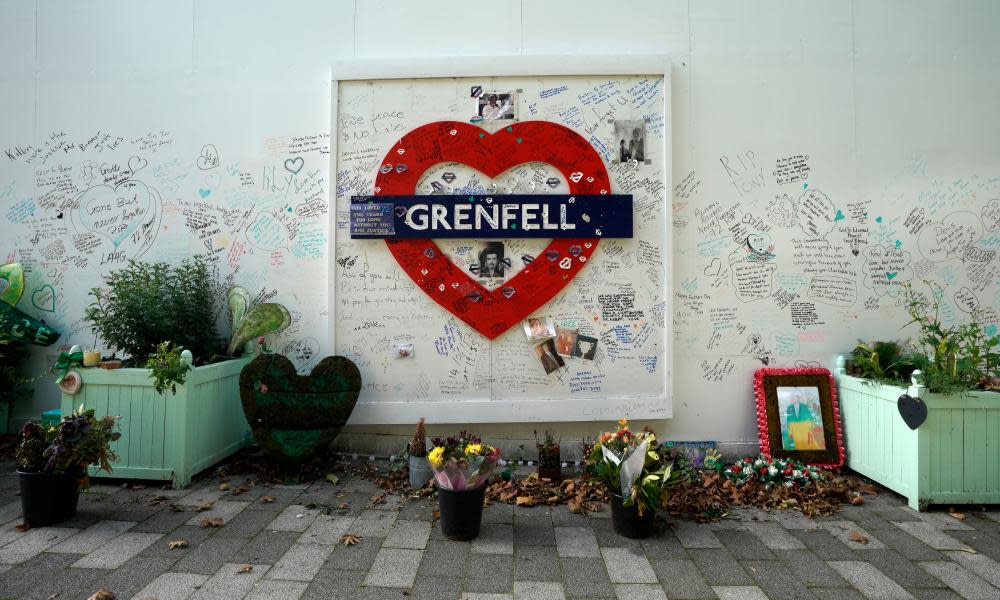Calls for Grenfell Tower inquiry to change way it deals with families

The chair of the Grenfell Tower public inquiry is facing calls to change how he deals with survivors and the bereaved when hearings restart, after a bruising conflict-of-interest row resulted in the resignation of a key panellist.
Grenfell United, which represents the majority of those who escaped the fire and lost loved ones, urged Sir Martin Moore-Bick to “bring this process back to putting families at the centre”.
The government declined to say on Sunday if or when it would replace Benita Mehra, who quit the inquiry panel on Saturday evening after she was revealed to have links to Arconic, the company that made the tower’s combustible cladding.
There was widespread anger at the prime minister’s appointment of Mehra after members of Grenfell United spotted that she previously ran an organisation that accepted a £71,000 grant from the Arconic Foundation, the cladding company’s charitable arm.
It took 10 days for Boris Johnson to announce her resignation after the links were revealed in the Guardian. It prompted the Hillsborough families support group to warn that the Grenfell families risked the same ordeal they went through in their often thwarted search for justice.
In a sign of the strain the row has placed on trust in the inquiry, community groups are planning to mount protests at the inquiry venue in Paddington when proceedings resume on Monday. Some fear the inquiry will not explore issues of race and class discrimination and the housing crisis that they believe underpinned the disaster that claimed 72 lives.
“They are not listening and they don’t want to listen,” said Nabil Choucair, who lost six members of his family in the fire. “The inquiry should be designed to look at the aspects we want them to look at.”
A spokesperson for Grenfell United said: “We need to know that the inquiry team will change how it deals with families. We’ve raised concerns many times now about the indifference shown towards bereaved and survivors by the secretary of the inquiry, Mark Fisher. This cannot go on.
“We need to know that the inquiry team will change how it deals with families, remove any blockages that staff may be creating and bring this process back to putting families at the centre. There must be a renewed commitment as phase two starts to finding truth and delivering justice for Britain’s worst residential fire since world war two.”
A Cabinet Office spokesperson said on Sunday: “It will not be possible to replace Benita Mehra before the phase two inquiry starts tomorrow. Further details will be released in due course.”
The shadow housing secretary, John Healey, urged the prime minister to give a statement to parliament on Monday explaining what went wrong and to apologise. “Why on earth did Boris Johnson put Benita Mehra and the Grenfell community in this position in the first place?” he tweeted.
The London mayor, Sadiq Khan, said: “This appointment should never have been made in the first place. The Grenfell inquiry must have the relevant expertise as well as the confidence of the community, survivors and the bereaved, so they can get the justice they deserve.”
In her resignation letter, Mehra told Johnson it was “a regrettable oversight” that she had not made the connection between her previous role – as president of the Women’s Engineering Society when it received the Arconic Foundation grant – to her position on the inquiry.
She wrote: “The last thing I would want to do is be the cause of any further distress to those who have already suffered such unimaginable losses and trauma; nor do I want to create any distractions from the vital work of the public inquiry as it enters into this crucial stage in its investigations.”
In its reply, Downing Street said the Cabinet Office still believed there was no conflict of interest.
The first phase of the inquiry established that the Arconic panels were the main cause of the fire’s spread. The second phase will hear evidence about the lead-up to the disaster on 14 June 2017, including “the decisions which led to the installation of a highly combustible cladding system”.
Mehra was one of two panellists appointed by Johnson. Survivors and the bereaved had lobbied for months for a panel, arguing that Moore-Bick, a retired appeal court judge, was unable to examine the social and political causes of the disaster alone.
Johnson eventually appointed two people with largely construction rather than community experience. The inquiry will now start with one panellist, Thouria Istephan, a partner at the architectural firm Foster and Partners, where she is in charge of health and safety compliance. She previously worked as an inspector for the Health and Safety Executive.
Responding to criticism of its approach to the bereaved and survivors, a spokesperson for the inquiry said it must remain impartial in order to maintain the integrity of its independence.
“However, it recognises the importance of engaging with the community wherever it is possible to do so within the confines of the legal process,” they said. “The inquiry does this through providing regular updates on its work, meetings with community groups and regular drop-ins to allow anyone from the community to meet members of the inquiry and ask any questions they have.”

 Yahoo News
Yahoo News 
